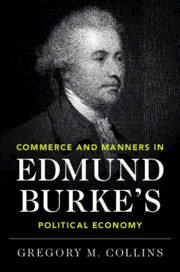Book contents
- Commerce and Manners in Edmund Burke’s Political Economy
- Commerce and Manners in Edmund Burke’s Political Economy
- Copyright page
- Dedication
- Contents
- Figures
- Tables
- Acknowledgments
- Introduction
- Part I Biography
- Part II Market Economies
- Part III The British Constitution and Economical Reform
- Part IV Foreign Trade
- Part V India
- Part VI The French Revolution
- 11 Reflections on the Revolution in France: Property, the Monied Interest, and the Assignats
- 12 The Real Rights of Men, Manners, and the Limits of Transactional Exchange
- Conclusion
- Bibliography
- Index
11 - Reflections on the Revolution in France: Property, the Monied Interest, and the Assignats
from Part VI - The French Revolution
Published online by Cambridge University Press: 24 April 2020
- Commerce and Manners in Edmund Burke’s Political Economy
- Commerce and Manners in Edmund Burke’s Political Economy
- Copyright page
- Dedication
- Contents
- Figures
- Tables
- Acknowledgments
- Introduction
- Part I Biography
- Part II Market Economies
- Part III The British Constitution and Economical Reform
- Part IV Foreign Trade
- Part V India
- Part VI The French Revolution
- 11 Reflections on the Revolution in France: Property, the Monied Interest, and the Assignats
- 12 The Real Rights of Men, Manners, and the Limits of Transactional Exchange
- Conclusion
- Bibliography
- Index
Summary
Chapter 11 unveils Burke’s understanding of the French Revolution through the lens of his principles of political economy. In Reflections on the Revolution in France, Burke attacked the Revolution for violating prescriptive property rights and subverting the market principles of supply and demand that he later defended in Thoughts and Details. In addition, I provide a thorough treatment of Burke’s criticism of the monied interest and the revolutionaries’ frenzied issuance of paper money called assignats. In his judgment, these two aspects of the Revolution shook the foundations of France’s system of revenue and discouraged commercial activity. The monied interest in particular exploited their position as state creditors to drive their pursuit of avaricious self-interest and wield a nefarious influence in the conduct of government affairs, which helped provoke the expansion of the French state. Such financiers, as well as the new middle class, were driven by ambition and speculation, supplanting the landed nobility and unsettling the social order of France. In Burke’s view, the landed interest was necessary to tame and channel such influences because their family pedigrees, ancestral estates, modern disposition, and commitment to the common good provided a stable foundation for market exchange and foreign investment to flourish.
Keywords
- Type
- Chapter
- Information
- Commerce and Manners in Edmund Burke's Political Economy , pp. 405 - 459Publisher: Cambridge University PressPrint publication year: 2020



